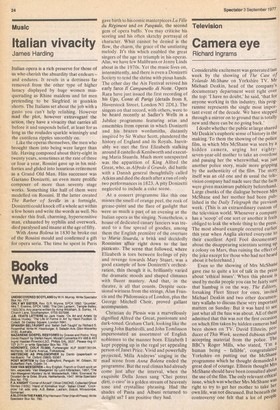Books Wanted
UNDISCOVERED SCOTLAND by W.H. Murray. Write Spectator Box No. 777.
ONLY MY SISTER, Rev. G.R. Wynne, SPCK 1892; 'Grumble', Mrs T. Erskine, SPCK 1686; 'The Dim Lantern', Temple Bailey, 1920/30's; Any poems written by Anna Wickham. S. Surrey, 14, Chtxch Lane, Southampton 0703 557098.
J.S. YEATS LETTERS by Jack Yeats: 'On Art and Artists by Aidous Huxley, The Life of Forms in Art' by Henri Focillon. G. Collett, 59 Oakley Square, London NVV1. SPANISH SELTAUGHT and 'Italian Sell-Taught' by Richard S. Rosenthal. Write W. Haarburger, 6, Saladin Ave, Glen Waverlay 3150, Australia.
NAZARENE GOSPEL RESTORED by Graves and Podro; 'King David Report' by Stefan Heym; Mozart Concertos KV 488 & 453 Ingrid Haebler/RowickiLS0, Philips SAL 3537. Please ring 01 727 2171 or write Spectator Box No. 778. HOROWRZ, COLH 72/300; Furtwangler XLP 30097/30104. McHardy, 34 Earls Avenue, Folkestone, NIETZSCHE AS PHLOSOPHER by Demo apttperback or hardback). Tel. Oxford (0865) 55367.
POSTMORTEM by Guy Cullingford, Penguin. W. Gibson, 32 Butterfield Park, Dublin 14.
HAM VAN MEEGEREN — Any English, French or Dutch work on him, especially 'Van Meegeren` by Lord Kilbracken, 1967; 'The Van Meegeren Mystery' by M. Molsekeltsch, 1964; 'Emmaus' by Doudart de M Gree, Brune, Netherlands, 1947. Write Spectator Box No. 779, F.A. KNIGHT 'Corner of Arcadr; Oliver ONIONS, Collected Ghost Stories (1935): 'Hand of Kornelius Voyr, 'Italian Chest, 'Cockcrow' let, eds. only. A.B. Baker, Ladram, &clod, Winscombe, Somerset, A SLOTH IN THE FAMILY by Hermann Tlrier (HarvIll Press) Write Spectator Box No. 780.
gave birth to his comic masterpieces La Fille du Regiment and on Pasquale, the second gem of opera buffo. You may criticise his scoring and his often sketchy portrayal of character. What cannot be denied is the flow, the charm, the grace of the unstinting melody. It's this which enabled the great singers of the age to triumph in his operas. Alas, we have few Malibrans or Jenny Linds about in the 1970s, Yet the music lives on, intermittently, and there is even a Donizetti Society to tend the shrine with pious hands. The other day the Aix Festival revived his early farce 11 Campanello di Notte. Opera Rara have just issued the first recording of his Ugo, Conte di Parigi (details from 8, Flaverstock Street, London Ni 2DL). The singers on that record, with others, were to be heard recently at Sadler's Wells in a Jubilee programme featuring arias and ensembles from opera's in which Donizetti and his brazen wordsmiths, distantly inspired by Sir Walter Scott, plundered the history of England and its Royals. Inevitably we met the first Elizabeth stalking around il castello di Kenilworth and executing Maria Stuarda. Much more unexpected was the apparition of King Alfred the Great, who, as Alfredo il Grande, did battle with a Danish general thoughtfully called Atkins and died the death after a run of only two performances in 1823. A pity Donizetti neglected to include a cake scene.
At a concert programme like this one misses the smell of orange peel, the reek of grease-paint and the flare of gaslight that were as much a part of an evening at the Italian opera as the singing. Nonetheless, a house of dedicated canary fanciers was treated to a fine spread of goodies, among them the English premiere of the overture to Maria Stuarda, a brisk and decidedly Rossinian affair right down to the last pizzicato. The scene that followed, where Elizabeth is torn between feelings of pity and revenge towards Mary Stuart, was a good example of how Donizetti's orchestration, thin though it is, brilliantly varied the dramatic moods and shaped climaxes with fluent mastery. And that, in the theatre, is all that counts. Despite occasional wiriness from the strings, Alun Francis and the Philomusica of London, plus the George Mitchell Choir, proved gallant accompanists.
Christian du Plessis was a marvellously dignified Alfred the Great, passionate and dark-toned. Graham Clark, looking like the young John Barbirolli, and John Tomlinson impersonated an assortment of English noblemen to the manner born. Elizabeth I kept popping up in the regal yet appealing person of Janet Price. Vivid and powerfully projected, Milla Andrews' singing in the mad' scene from Anna Bolena ended the programme. But the real climax had already come just after the interval, when the exquisite Della Jones sang `Chei potrei dirti, o cam' in a golden stream of heavenly tone and crystalline phrasing. Had the shades of Pasta and Albani returned to delight us? I am positive they had.






























 Previous page
Previous page